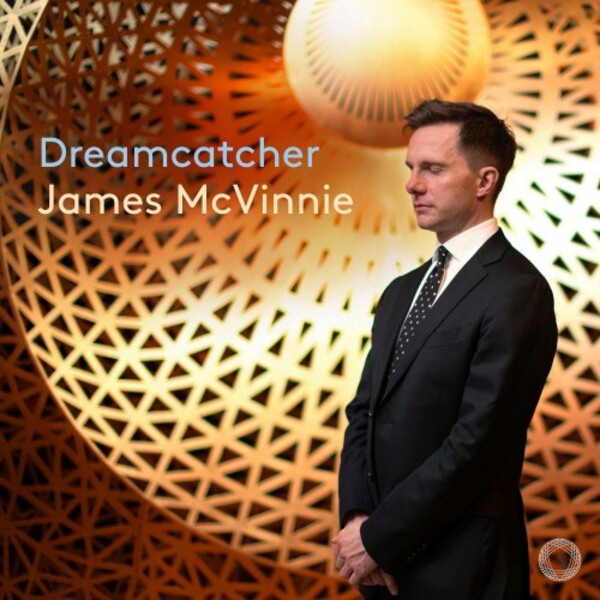James McVinnie: Dreamcatcher
View record and artist detailsRecord and Artist Details
Genre:
Instrumental
Label: Pentatone
Magazine Review Date: 03/2025
Media Format: CD or Download
Media Runtime: 69
Mastering:
DDD
Catalogue Number: PTC5187 404

Tracks:
| Composition | Artist Credit |
|---|---|
| Imaginary Pancake |
Gabriella Smith, Composer
James McVinnie, Organ |
| Patterns |
Nico Muhly, Composer
James McVinnie, Organ |
| The Unquestioned Answer |
Laurie Spiegel, Composer
James McVinnie, Organ |
| Ellis Island |
Meredith Monk, Composer
James McVinnie, Organ |
| build-it-yourself |
inti figgis-vizueta, Composer
James McVinnie, Organ |
| Dreamcatcher |
Marcos Balter, Composer
James McVinnie, Organ |
| China Gates |
John Adams, Composer
James McVinnie, Organ |
| Riff-raff |
Giles (Oliver Cairnes) Swayne, Composer
James McVinnie, Organ |
| Song for Octave |
Bryce Dessner, Composer
James McVinnie, Organ |
Author: Adrian Edwards
Has the king of instruments ever been so well served as by James McVinnie on this recital of piano solos and organ works, the latter recorded in St Alban’s Cathedral, where McVinnie served his apprenticeship for two years, from the age of 18, on the Ralph Downes instrument?
The album’s title is drawn from the piano track by Marcos Balter, a brief composition in mimimalist style, intended to send a strong message against the zero-tolerance policy on the US border during the first Trump presidency. All these compositions carry their respective composers’ mission statements, a couple a tad highfalutin – intended as balm for a divided world. So does the music carrying that message live up to the intent? Two may be declared, without hesitation, as significant contributions to the organ repertoire and both are receiving their first recordings. Nico Muhly’s Patterns, from 2015, is in four contrasting sections, opening with ‘Move along’, in which a decorative topping is underlaid by a fragmented cantus firmus. It concludes with a brilliant quasi-toccata, ‘manic and hyper’, to quote the composer, ‘with hiccoughs offsetting the regularity of some of the rhythms’. In contrast, there’s a meditative, even spiritual tone to the third movement, ‘Similar’, the music akin to a recessional at a choral evensong. Patterns was written for John Scott, a pioneering figure in the organ world, for whom, McVinnie suggests, it represents an appropriate posthumous tribute.
Also a first recording is Giles Swayne’s Riff-Raff, premiered on this organ by Andrew Parnell in 1983. That great title was inspired by a field trip Swayne took to Senegal, visiting the indigenous folk of the Jola community. The opening recurring motif, consisting of three staccato chords, weaves in and out of episodes reflecting the unbuttoned spirit of the Jola. No more so than in a boogie-woogie of dazzling virtuosity, a reflection no doubt of their male-voice singing, often of a lewd nature, according to Swayne. The myriad textures and grand climaxes fade, leaving that recurring motif hanging on for dear life. Post it up there with Bach and Messiaen, both of whom knew a thing or two to awaken the soul.
The two shorter organ works are The Unquestioned Answer, a reflection of Laurie Spiegel’s fascination with the link between synthesisers and pipe organ, and Ellis Island, drawn from a film score. Meredith Monk’s eerie evocation portrays immigrants arriving in America, their ‘ghosts’ informing their character today. Adapted by McVinnie from a version for two pianos, one couldn’t imagine the spectral feeling better conveyed than on the organ manuals.
Of the piano repertoire, China Gates has gained much currency, not least in the playful account by Yuja Wang coupled with Adams’s concerto Must the Devil Have All the Good Tunes? (DG, 6/20). McVinnie’s more sober account is no less valid for that; likewise his advocacy of Gabriella Smith’s Imaginary Pancake (no relation to the Frank Zappa track), inspired by late Beethoven, the spare imaginings of Inti Figgis-Vizueta’s build-it-yourself or the aforementioned Dreamcatcher. He concludes with a lullaby by Bryce Dessner for the birth of his son, Octave.
The recordings are of brilliant clarity, particularly of the organ, capturing the special timbres of its registers in close-up as well as the cathedral ambience. The playing itself is little short of mind-blowing, McVinnie’s dexterity a thing of wonder.
Discover the world's largest classical music catalogue with Presto Music.

Gramophone Digital Club
- Digital Edition
- Digital Archive
- Reviews Database
- Full website access
From £8.75 / month
Subscribe
Gramophone Full Club
- Print Edition
- Digital Edition
- Digital Archive
- Reviews Database
- Full website access
From £11.00 / month
Subscribe
If you are a library, university or other organisation that would be interested in an institutional subscription to Gramophone please click here for further information.




